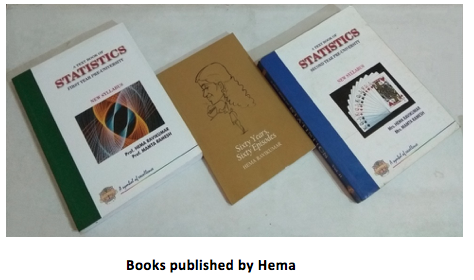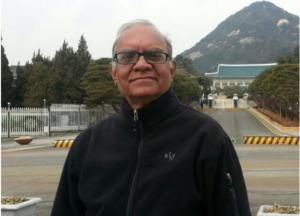Ethics and Empowerment
“When your values are clear to you, making decisions become easier”.
– Roy E Disney (b. 1930) – Son of Roy Oliver Disney, Co founder of Walt Disney Co
I think confidence and empowerment are interconnected. Empowerment comes from within; typically it stems from and is fostered by self-assurance. To feel empowered is to feel free and that’s when one can do his best. Friedrich Nietzsche (1844–1900), who believed that embracing difficulty is essential for a fulfilling life, considered the journey of self-discovery one of the greatest and most fertile existential difficulties.
During my growing years (1950-68), I wasn’t subject to great academic or peer pressure. I could spend sufficient time in play, reading a variety of books, and being with people, both young and old. This helped me build a general perspective of life for later years. Having spent most of my growing years in my ancestral home amidst elders, siblings, and visiting relatives, my focus was on sustaining family and social values, over and above comfortable living.
At various stages of transition in my life, duty towards family was on top of my mind, rather than excelling in something or to be unique. However, having realized that my parents’ focus was on their basic duties and that they were not really motivated to connect with the external world other than immediate relatives, I learnt to detach myself from emotional bindings, in order to focus on higher education and career. During my adolescence, being associated with classmates and neighbourhood boys who were mostly into movies, sports, and other activities driven by biological instincts rather than academics, it needed great effort to avoid getting distracted from my main goal: Education. Because of the family upbringing, I could balance between my academics and other activities without hurting myself or my family’s reputation, by coming out with flying colours in the school examinations. This also helped me during later stages in my higher education, professional career and business; to focus on the job on hand, rather than discussing the past or worrying about future.
 I’ve always believed in empowering people who lived with me and worked for me so that I could attend to my work. I found this a challenging task and had to limit to only a few people who had faith in me. After marriage, when I found out that my wife, who was brought up in a typical Indian conservative environment, didn’t know driving, I taught her cycling initially, then riding a two-wheeler, before moving on to car-driving. It was spread over a few years and helped her to move about independently. This extended to independent domestic travel as well as international travel.
I’ve always believed in empowering people who lived with me and worked for me so that I could attend to my work. I found this a challenging task and had to limit to only a few people who had faith in me. After marriage, when I found out that my wife, who was brought up in a typical Indian conservative environment, didn’t know driving, I taught her cycling initially, then riding a two-wheeler, before moving on to car-driving. It was spread over a few years and helped her to move about independently. This extended to independent domestic travel as well as international travel.  Over a period of time, it extended to publishing books too. I tried to empower some of my assistants at my workplace at the Indian Telephone Industries and in my business. I was surprised that many were not keen to learn. Over time I realized I shouldn’t waste my time and efforts to change others’ nature, mainly attitude.
Over a period of time, it extended to publishing books too. I tried to empower some of my assistants at my workplace at the Indian Telephone Industries and in my business. I was surprised that many were not keen to learn. Over time I realized I shouldn’t waste my time and efforts to change others’ nature, mainly attitude.
 I recall my mother telling me that my father, who was employed as a Fitter with the Military Engineering Services (MES) at Bangalore, wouldn’t have been transferred under normal circumstances. Sometime in 1956, he questioned his Engineering Supervisor about his action of transferring cement bags from the project site to his house. To avoid future embarrassment, the supervisor ensured that my father was transferred to another distant project site in Kadakhavasala (12 miles from Pune) where the National Defence Academy was coming up.
I recall my mother telling me that my father, who was employed as a Fitter with the Military Engineering Services (MES) at Bangalore, wouldn’t have been transferred under normal circumstances. Sometime in 1956, he questioned his Engineering Supervisor about his action of transferring cement bags from the project site to his house. To avoid future embarrassment, the supervisor ensured that my father was transferred to another distant project site in Kadakhavasala (12 miles from Pune) where the National Defence Academy was coming up.
Because of my father’s transfer, though I lost couple of years of academics in the growing years, it helped me in knowing more about life and people. During those two years (1958-60) my paternal grandmother, who was already over seventy, was my guardian. I observed from her daily routine many important aspects of life, which helped me a lot in later years. In 1993, I established a charitable trust named after her, Kaveri Trust, along with Hema and my auditor CA Suresh, mainly to support education of economically backward girl children. Hema and I have been contributing a small percentage of our annual income to this trust, which has supported education of a few hundred children over these years and help me publish a few books. I have always believed that educating the young ones, is one form of empowerment.
Within a few years of being in business, I realised that typically businessmen didn’t attach importance to ethics, which I considered important. Added to that, the government bureaucracy, especially at the last mile has never been helpful to entrepreneurs; they expect us to pay something for not interfering with business. When I was an MBA student (1977-79), I didn’t study a subject called Business Ethics. This subject was introduced only some time during mid – to late eighties in the business schools of United States and Europe. It is hence obvious that with increasing unethical practices, B Schools felt the need to introduce Business Ethics as a separate subject.
 With technology and innovation driving the economy, individuals have become busy in equipping themselves in terms of knowledge and skills to exploit the increased opportunities for creating wealth. Also with increased competition, the tendency is to do it fast rather than to do it right. Perhaps this has led to compromising on ethics, which includes exploitation of the innocent and the ignorant. Having understood this, I recently established Impact Foundation (2015), mainly to support start-ups and NGOs that would make social impact in the areas of education and health, ensuring ethics are not compromised, while focus shall be on stability and sustainability, rather than scaling up.
With technology and innovation driving the economy, individuals have become busy in equipping themselves in terms of knowledge and skills to exploit the increased opportunities for creating wealth. Also with increased competition, the tendency is to do it fast rather than to do it right. Perhaps this has led to compromising on ethics, which includes exploitation of the innocent and the ignorant. Having understood this, I recently established Impact Foundation (2015), mainly to support start-ups and NGOs that would make social impact in the areas of education and health, ensuring ethics are not compromised, while focus shall be on stability and sustainability, rather than scaling up.
Empowerment in today’s context perhaps may mean ‘the extent to which we are able to use technology for our daily chores including mobility to ensure day-to-day life is comfortable.’ In the current technology-driven world, we are exposed to too much of data and information. So we spend more time and mental space for analysing or using this data/information, depending on perception, ease of application and demands of the situation, rather than on introspection, which is the basis for empowerment.
April 01, 2019 | Ravi 12


